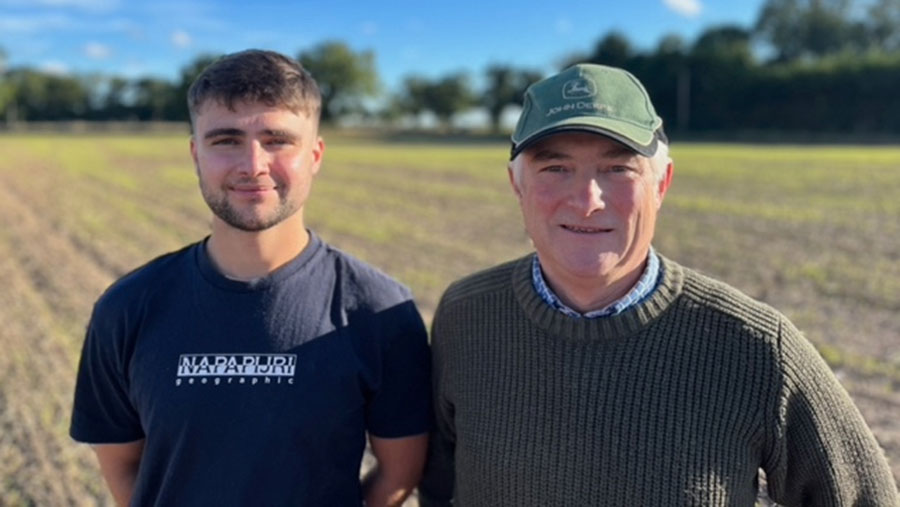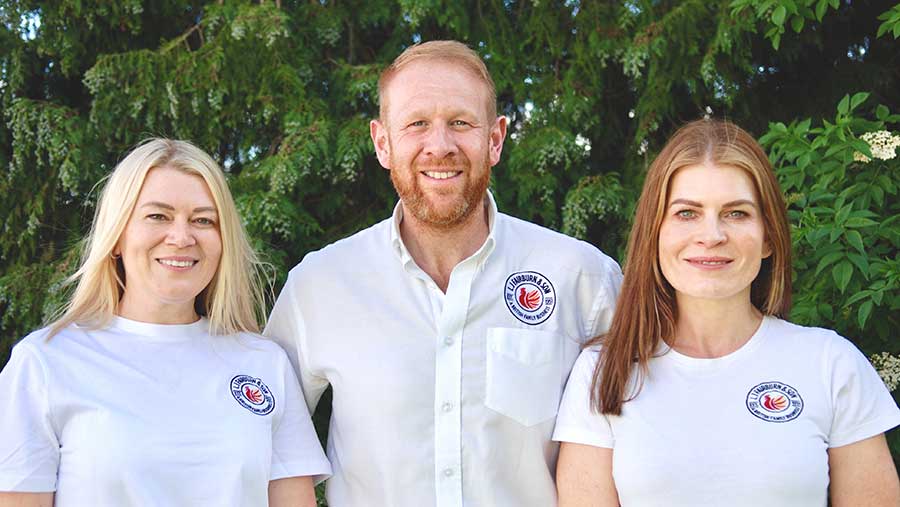Advertiser content
How farmers are taking the jeopardy out of egg production
Philip Wright and his family have been farming their 600 acre farm in Norfolk for four generations.
Predominantly focused on arable, about 15 years ago he diversified into egg production and since then has become one of the largest free range producers in the region.
But a triple whammy over the last 18 months of rising energy and feed costs, plus Avian Influenza, put a question mark over this now key part of his business.

Philip Wright and his son, George Wright © L J Fairburn & Son
Thanks however to an industry-first initiative from producer and packer Fairburn’s Eggs, the Wrights have just restocked their flock and are looking forward to a cracking return once again on their egg production enterprise.
“Keeping free range hens seemed to be the right path to follow when we first diversified so we took the plunge and invested in two 16,000 bird sheds,” Philip said.
Three years later he had doubled the flock size and, as the business was going so well, he added a multi-tier unit to take the flock size up to 100,000 with seven sheds in total.
In 2022 the egg industry was then impacted by rising energy prices and feed costs, at the same time as Avian Influenza hit flocks across the country.
No surprise then that many egg producers, including the Wrights, started to rethink their future plans.
As a farmer himself, Daniel Fairburn, CEO of Fairburn’s Eggs, knew that his industry was going through a tough patch and so with agricultural consultant Martin Farley, they hatched a plan that would provide the reassurance producers so desperately needed.
“We wanted loyal producers to be paid a fair fee for looking after birds to our welfare standards, whilst taking away as many risks as we could of rising costs and insecurities in the market,” said Daniel.
Realising there was a model that had worked well in the pig sector for years that they could adapt for egg producers, the company’s ‘bed and breakfast’ partnership was launched.
It is designed to support producers by providing certainty over return, avoiding the requirement to make large initial cash outlays for pullets and feed, and by minimising the exposure to volatility of input costs.
A bespoke contract is created to suit each prospective producer, and there is no minimum or maximum flock size:
- Producers receive a pre-agreed amount per bird for each flock, covering birds housed from 16 weeks to 76 weeks plus 3 weeks’ turnaround. A bonus is also paid for every flock dependant on production. Producers must adhere to agreed biosecurity standards in addition to the Lion Code, RSPCA and APHA standards.
- As part of the arrangement, Fairburn’s Eggs provides and funds every pullet, feed from its Lincolnshire mill and vet fees, in return for the income from eggs and old hens.
- Producers are responsible for labour, water, repairs, building insurance, clean downs, bird removal and pest control. They are also responsible for manure and can retain any income derived from it. If for any reason a producer wants to leave the partnership, they just have to give a full flock’s notice to terminate the arrangement.
As one of the UK’s largest independent producers and packers, Fairburn’s Eggs is a vertically integrated business and so has the expertise and infrastructure required to run this type of partnership.
Its field-to-fridge approach means it rears its own birds; mills and develops feeds; produces, packs and delivers eggs, manages relationships with leading retailers, and has a wealth of experience that other producers can tap into.
A third-generation family business, it is based in Burgh Le Marsh near Skegness and run by Daniel, alongside his sisters Sarah and Caroline.

From left to right: Sarah Hall, Daniel Fairburn and Carline Fairburn-Wright © L J Fairburn & Son
Philip Wright was one of the first producers to sign up to the Fairburn’s Eggs ‘bed and breakfast’ partnership.
“I wanted to minimise my financial risk,” explained Philip. “By partnering with Fairburn’s, I guarantee my investment and it really helps with my cash flow. Also dealing with the team at Fairburn’s is so refreshing. They are a family business and you can really talk to them. They want to support you and are not only interested in profit.”
With his first ‘bed and breakfast’ flock now around 6 months old, he said: “So far everything is working really well. It’s great that Fairburn’s pay for the electricity, which is a massive cost, plus all the feed, enrichment and pullets. It improves my cash flow tremendously.”
He added: “More farmers ought to look into this, it’s definitely worthwhile. I think this has to be the way forward for the industry. Egg production had just got too risky and this way Fairburn’s shoulder the majority of the risk.”
Interested in finding out more about the award-winning ‘bed and breakfast’ partnership?
Provided by
A third generation British Family Business, producing eggs in Lincolnshire since 1951. In control of every process from day old chick to the family fridge.
